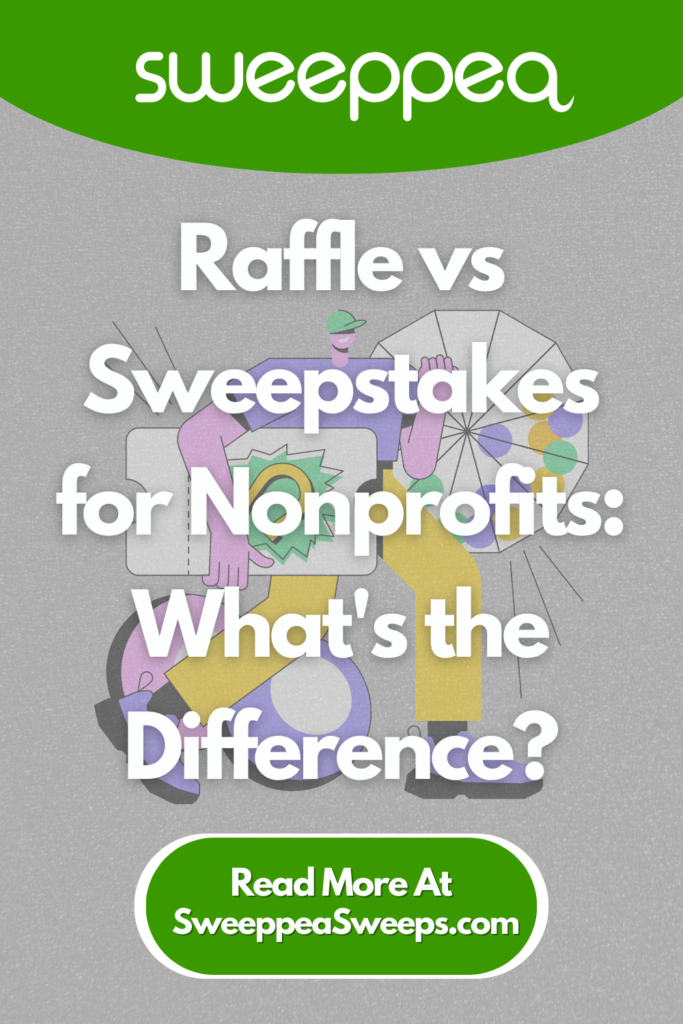
When nonprofit organizations are looking for a way to raise money, they often turn to raffles and sweepstakes. What is the difference between these two types of fundraising vehicles? And which one is suitable for your nonprofit? In this article, we will explore the difference between raffles and sweepstakes and discuss which one might be a better fit for your nonprofit.
Raffles for Nonprofit
Raffles are a type of lottery in which people purchase tickets for a chance to win a prize. The nonprofit sells the tickets and keeps all of the proceeds. Raffles are regulated by state law, so be sure to check the state regulations before running one.
Even though the raffle ticket suggests a modest amount of money, it encourages individuals to make a difference on a personal level by contributing to a cause they care about.
Benefits of Running a Raffle vs. Sweepstakes
There are several benefits to running a raffle for your nonprofit listed below.
- Encourages People to Donate
A raffle fundraising campaign makes individuals feel connected. They like to support a cause they believe in. As a result, fundraisers must effectively communicate the purpose or goal of their event.
You can accomplish this by sharing a cohesive message about your promotion through all your communication channels both online and traditional. If you want to gauge your audience’s interest in a particular prize, ask them through your communication channels! This will ensure you pick the best prize for your audience so you can run a successful promotion.
- Encourages Mutual Relationships Between Nonprofits and Local Businesses
Raffles help nonprofit organizations raise money and establish mutually beneficial relationships with local businesses. The non-profits and local businesses can collaborate to create an irresistible prize for the target audience.
If you’re interested in collaborating with a local business, make sure the collaboration keeps the promotion on legally-compliant ground.
- Encourages a Productive Atmosphere
Raffles may be a fantastic nonprofit fundraising trend for schools and colleges. It promotes creativity, innovation, and inclusiveness among students. The event unites all of the instructors, pupils, and families to share their fundraising ideas. It encourages everyone to participate and collaborate.
Nonprofit organizations can also benefit from all the three points listed above making it a great choice to raise funds for a cause.
What is a Sweepstakes?
Sweepstakes are similar to raffles in that:
- They require a method of entry
- Random selection of the winner
- Prize distribution
The most significant distinction is that participants are not required to purchase to enter a sweepstakes. This is why sweepstakes are not considered gambling and are permitted in all 50 states and regulated by the FTC to prevent fraud.
Sweepstakes may not require an entrant to buy a product in order to participate, but a participant may be asked to donate in order to enter as long as a free method of entry is available to all
Even though you don’t have to buy anything or give money to enter a charitable sweepstake, qualitative industry data shows that most people are willing to donate money to enter because they believe in the cause.
If you’re interested in running a purchase to enter sweepstakes, check out: No Purchase Necessary Laws: Can You Run a Sweepstakes That Requires a Purchase to Enter?
Social Sharing
A prize draws new contributors and encourages viral sharing.
Sweepstakes let you use the viral sharing aspect of fundraising to get the word out about your nonprofit fundraiser on social media and in traditional media. The sweepstakes are broadcast across the country, and contributions pour in.
Reach New Local and National Donors for Your Organization
Sweepstakes can be offered in all 50 states, even if your charity isn’t registered in each of them. This means you’ll be able to attract new contributors and sponsors from outside of your community. You’ll be able to achieve your objectives quicker by attracting donations from across the country.
Raffle vs. Sweepstakes
There are a lot of differences between a raffle and sweepstakes that should help you decide which one to run for your nonprofit organization.
Here are the most significant sweepstakes vs. raffle points:
Regulations
- Raffles: Are illegal in some states in the US and Canadian provinces. Please seek legal advice before planning or operating a raffle or lottery. A state or provincial license may be required to run a raffle.
- Sweepstakes: It’s legal in all 50 states and every province in Canada.
Geographic Reach
- Raffles: Limited to a specific set of US or Canadian provinces.
- Sweepstakes: Expand your organization and gain more visibility by selling goods, advertising, and sponsorships to clients.
Numbers of Entries per Person
- Raffles: Each person may have up to five entries.
- Sweepstakes: One entry per person or as many as offered.
Donations
- Raffles: can receive donations only from donors that are residents of the state(s) the nonprofit is registered in.
- Sweepstakes: can receive donations from residents of any of the 50 states.
Online raffles and sweepstakes are a fantastic tool to generate donations online. Knowing your fundraising goals, objectives, and plan inside and out will help you figure out which option is best for you.
Conclusion
Running a raffle or sweepstakes is an excellent way for nonprofit organizations to raise funds. However, which one is best for your organization depends on your objectives and preferences.
A raffle may be the ideal alternative if you want to raise funds locally. Sweepstakes, on the other hand, might be the way to go if you want to raise funds nationally. Whichever option you pick, double-check the criteria before getting started.
Need help with sweepstakes or contest management? Call 305-505-5393 or email us with your questions.

